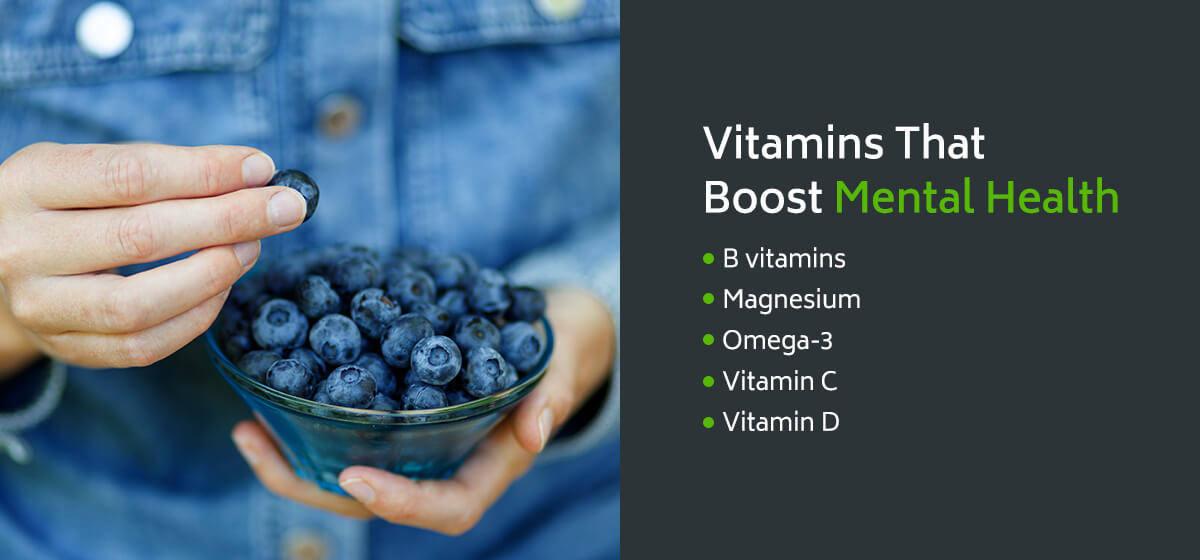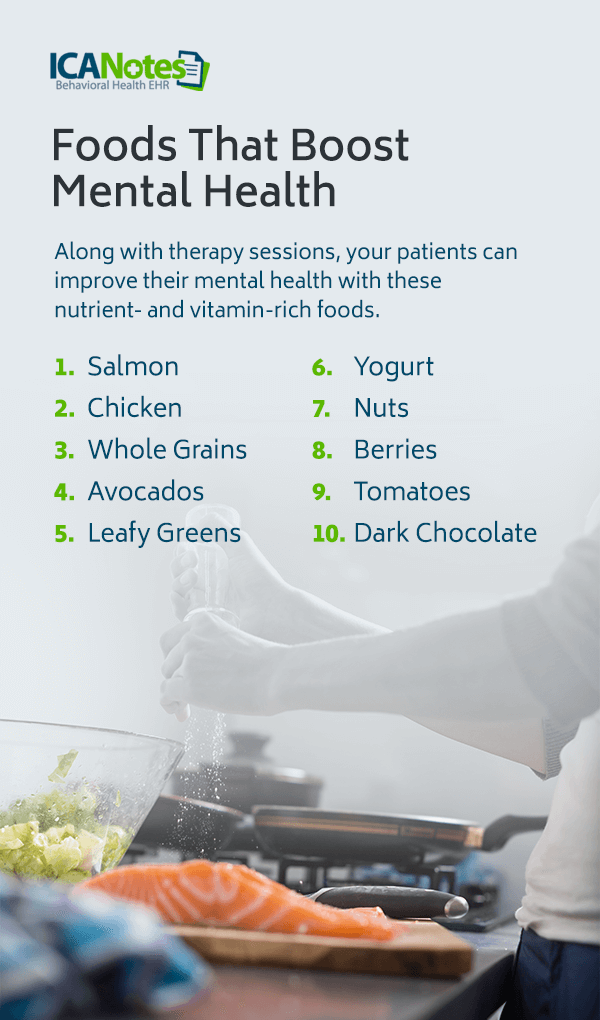
10 Foods that Boost Mental Health
Did you know the food your patients eat can impact their mental health? Many people focus on weight loss when planning a new diet, though you can also use a healthy diet to improve brain function, help fight cognitive diseases and boost mental health. The natural vitamins and healthy fats in these foods can benefit the brain and make great additions to your patients' diets.
INSTANT DOWNLOAD:
Foods that Boost Mental Health Shopping List

Vitamins That Boost Mental Health
Numerous vitamins and nutrients have been found to positively impact mental health and mood. Incorporating foods with these vitamins into a diet can help improve brain function and mental health:
- B vitamins: B12 and B9 (folate) are well-known for influencing mental health and mood. B vitamins are necessary to produce neurotransmitters like serotonin and dopamine, which contribute to pleasure and overall mood.
- Magnesium: This vitamin helps regulate the nervous system. Adding magnesium to a diet can help reduce the risk of depression.
- Omega-3: Fatty acids like omega-3 can contribute to improved mood disorders and neurotransmitter function to boost mental state.
- Vitamin C: In addition to boosting the immune system, vitamin C can impact energy levels, mood, anxiety and mental function.
- Vitamin D: Many mental health conditions have been associated with low vitamin D levels. Adding this vitamin to a diet can help improve brain function and mood.
Foods That Boost Mental Health
While many of those vitamins can be supplemented, your patients may prefer to consume them more naturally. Along with therapy sessions, your patients can improve their mental health with these nutrient- and vitamin-rich foods.
1. Salmon
Fish is generally a healthy choice for dieting — especially salmon. Salmon contains high levels of omega-3 fatty acids. Omega-3s are linked to reducing depression symptoms and other mental disorders and can boost memory and learning in the brain. Salmon also provides natural vitamin D, which is linked to lower depression rates. Mackerel, tuna and herring are also great fatty fish to include in a diet.
2. Chicken
Chicken contains tryptophan, the same amino acid in turkey often associated with the sleepy feeling after Thanksgiving dinner. While tryptophan doesn't actually make you tired, it does assist in serotonin production. The brain uses serotonin to help manage mood, maintain memory and fight mental disorders like depression. Chicken also contains other valuable nutrients for the brain, like vitamin B and magnesium.
3. Whole Grains
Whole grains are a broad category, including foods like oats, beans, wild rice and soy. The brain and body need complex carbohydrates like these to encourage slow glucose production and provide consistent energy. More often, however, many people consume simple carbs and experience spiked blood pressure, which is associated with several mental health disorders.
Whole grains also assist with tryptophan absorption. So, when eating whole grains with turkey or chicken, your patients set their brains up for better success in reducing depression and anxiety symptoms.
4. Avocados
Avocados are an extremely brain-healthy food. Avocados contain high amounts of healthy fats that aid in brain function. They also contain high amounts of lutein, which has been linked to having positive brain impacts. Avocados also pack lots of folate and vitamin K, helping to improve mood, memory and concentration. These foods are also rich in other nutrients like vitamin Bs, magnesium, vitamin C and more, all of which contribute to brain health.
5. Leafy Greens
Leafy greens like spinach and kale supply lots of folate to help the brain deter depression, reduce the risk of dementia and fight off insomnia, which is often associated with other mental disorders. Dark leafy greens are also high in omega-3s, magnesium and other nutrients, making them a well-rounded brain food.
There are many ways to include leafy greens in a diet, from salads to green smoothies, so find a way to incorporate leafy greens that works for your patient.
6. Yogurt
Products containing active cultures, like yogurt, are among the best probiotic sources. Probiotics break down food, allowing the body and brain to access and use the nutrients consumed. Research shows a healthy gut is strongly associated with mental well-being, making yogurt and other fermented foods a good addition to your mental health meal plan to help patients reduce anxiety and stress.
Yogurt also contains magnesium and potassium, which help oxygen travel to the brain. With more oxygen in the brain, it can function more effectively. Vitamin D is found in yogurts, too, helping support mood.
7. Nuts
Various types of nuts are great sources of omega-3 fatty acids. To name a few, cashews, walnuts and chia seeds have high concentrations of omega-3s. These nutrients are known for helping ease depression symptoms and supporting brain function. Many nuts also contain high doses of magnesium, which helps get oxygen to the brain.
Other nuts, like almonds, contain phenylalanine, which helps the brain produce neurotransmitters like norepinephrine that can improve mood. Phenylalanine is also believed to help reduce Parkinson's Disease symptoms.
8. Berries
Mixed berries like strawberries, blueberries, raspberries and blackberries contain valuable antioxidants that are vital for mental health. Studies have shown that antioxidants from foods like berries can help prevent and reduce depression symptoms. Antioxidants have also been associated with helping anxiety and other mental health issues. Since berries are high in antioxidants, they're must-have foods in a mental health diet.
9. Tomatoes
Lycopene, the phytonutrient responsible for a tomato's red color, is extremely beneficial in many areas of health. For example, it may help the body fight brain disease, prevent cell damage associated with Alzheimer's Disease, and benefit concentration, attention, memory and logic.
Tomatoes also contain beneficial amounts of folic acid and folate, which prevents homocysteine from building up in the body. Homocysteine prevents neurotransmitters like dopamine and serotonin from producing in the brain, so folic acid from tomatoes supports the brain in neurotransmitter production.
10. Dark Chocolate
Did you know opting for dark chocolate instead of milk chocolate can benefit your health? This is due to the higher cocoa content in dark chocolate, which contains high levels of an antioxidant called flavonoids. Dark chocolate and flavonoids can positively affect mood, memory, attention and the ability to fight cognitive decline as your patients age.
The darker the chocolate, the more cocoa, which means more antioxidants. To be most beneficial, dark chocolate should contain 85% cocoa or more. Despite being healthier than milk chocolate, dark chocolate should still be consumed in moderation.
Making Meals With Foods for Mental Health
Your patients can turn many of these items into well-rounded meals or include them in their favorite dishes. For example, a berry and dark chocolate parfait is a great way to give the brain valuable nutrients first thing in the morning. Or, add several ingredients on this list, like chicken or salmon, avocado, tomato and nuts, to a leafy green salad.
There are nearly limitless ways to incorporate these foods into a diet. Encourage your patients to add one or more of these foods to their grocery list. Set a goal for them to brainstorm a mental health meal plan that's feasible for them to cook, prepare and enjoy.
Document Healthy Food Interventions in Treatment Plans With ICANotes
Whether you're suggesting a healthier diet or setting goals with a patient, ICANotes makes it easier to create, monitor and share mental health treatment plans and notes. Request a free trial to find out if ICANotes is right for you.
Start Your Free Trial Today - no credit card required!















[…] love salmon. Whether fillets or smoked, this delicious fish contains Omega-3, which has been related to boosting the mind. It also contains vitamin D, which tends to give people a bit of a boost too. […]